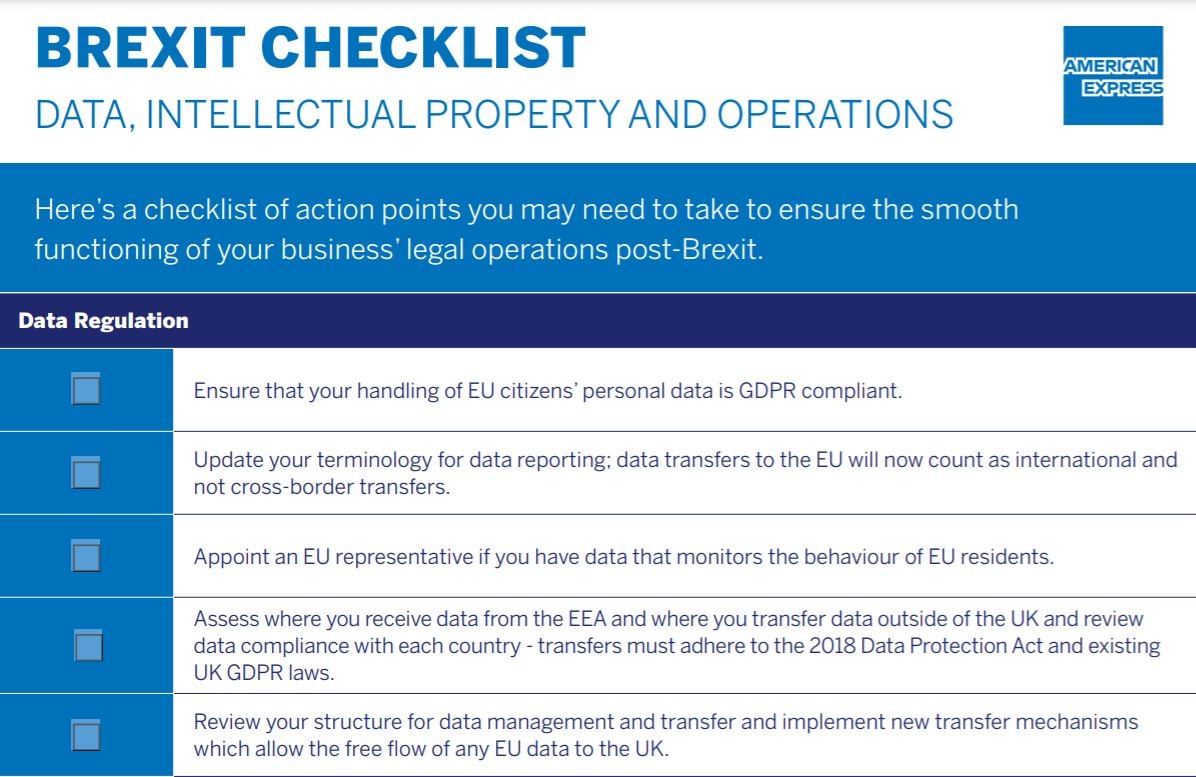There are a myriad of post-Brexit legal issues that could have an impact on the day-to-day running of SMEs. Beyond taxes and tariffs - hiring from the EU, managing EU customers’ data, cross-border data transfer and registration of intellectual property will need revisiting. This article will offer some practical guidance to help business owners successfully manoeuvre the legalities of a post-Brexit world.
And, in order to make all the changes easier to digest, we have created a printable checklist with what you need to do to stay on top of data regulations, hire from the EU, and manage your intellectual property. Download it here.
Click on the image to enlarge and download an editable PDF template
Data regulation - the bridging period
After exploring the potential impact of Brexit on data transfer, Richard Alvin, Group Director at Capital Business Media, says his team decided to move the content and SEO division of the company to Dublin and register as a new legal company. “By moving to Ireland, we removed any possible problems that a change in regulation could bring. Why? Being able to send emails to our database of 275,000 UK and Europe based SMEs is essential to our business.”
However, the EU-UK trade agreement has a built-in bridging period - a four-month delay - in potential changes to the way personal data is transferred: “So, as it stands, EEA – UK data transfers are still completely legal for at least quarter one of 2021, says Alvin. “While this is good news, alarm bells are ringing given the fact that we are a month post-Brexit and still none the wiser about what future laws will stipulate.”
Prepare for potential disruption
In a digital world, any changes to data transfer regulation could have a big impact on business. To prepare for potential changes to EU-UK data regulation, Alvin recommends reaching out to a legal specialist at a credible firm to seek support: “The only way you can make these decisions is if you are fully aware of the options available to you and the justification for each. Implement new transfer mechanisms allowing the free flow of any EU data to the UK, whether it’s removing the transfer of EU data completely, or moving part of your business to an EU country. It’s highly recommended that you begin implementing these changes now.”
Until the Government issues further notice at the end of the bridging period, UK businesses handling the personal data of EU citizens will need to continue to adhere to UK GDPR, which sits in an updated version of the Data Protection Act compliance. There are also some requirements for changes to reporting: data transfers will now count as international and not cross-border transfers. In addition to this, organisations that provide goods or services or monitor behaviour of EU residents will need to appoint an EU representative, under EU GDPR.
Hiring from the EU
Under the points-based immigration system, there are new rules for hiring from the EU. Employers will need to apply for a sponsor licence to hire most EU workers, and the proposed job will have to meet skill and salary thresholds. Equally, EU citizens will need to apply for a visa before they move to the UK to work.
If you already have employees who are EU citizens, you can support their application for the EU settlement scheme, or check a potential employee’s right to work status using the Government’s employer toolkit.
Intellectual Property
There are Brexit-related changes to intellectual property law; new applications to start proceedings for patents, trademarks and designs will need to have a UK address for service. UK-based representatives will also no longer be able to directly represent clients before the EU’s IPO - you will need an EU-based partner to do this. Equally, if you’re EU-based, you will need a UK representative to challenge or defend intellectual property rights.
If your business holds an EU trademark, the UK’s Intellectual Property Office (IPO) will create a comparable UK trademark, details about the trademark will be listed on GOV.UK and the Government recommends you can take a screenshot as proof of your right.
Simon Hyde, CEO of FAUN-Zoeller, the UK branch of a German waste management firm, says that since their products have been registered with EU trademarks, they sought confirmation from the UK IPO that it would create an equivalent new UK trade mark. “We also use CE marking and are preparing to start with the new UKCA from 1st January 2022,” says Hyde. “In addition, our products were subject to EU vehicle type approvals, all of which were converted into UK type approvals.” Going forward, businesses looking to file for a new trademark or design may want to consider filing in both the UK and the EU.
Download our check list to tick off any to-dos on your data, intellectual property and operations Brexit-preparedness, and ensure your business is on the right footing to weather the obstacles and grab hold of new opportunities.
For more insights on how you can manage your supply chain, read our Brexit check list on customs regulations.




